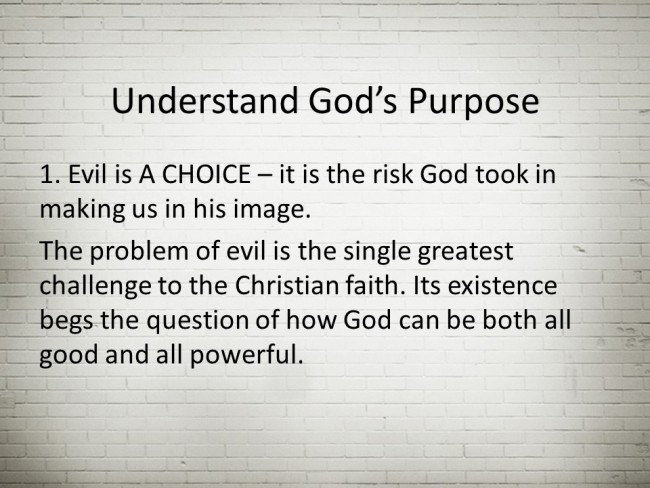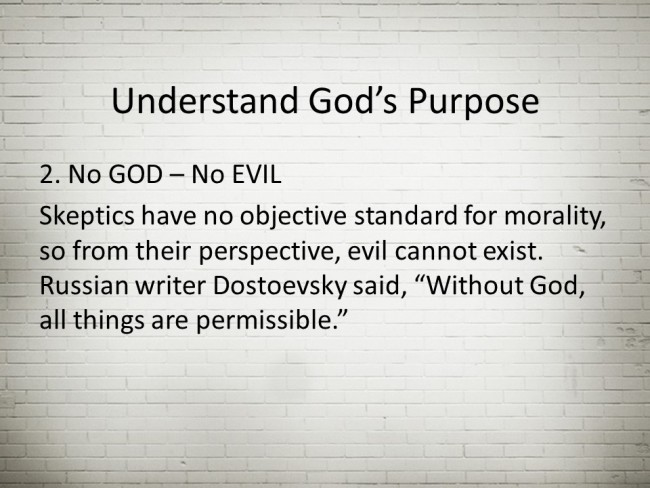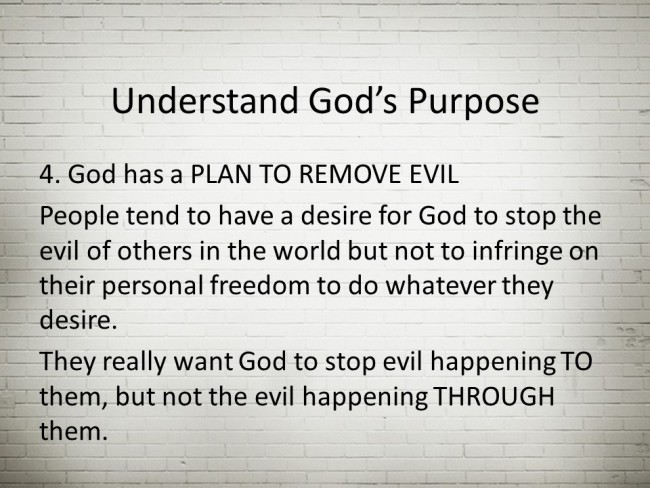Life on Purpose, from Matthew 28:16-20
Why in the world am I here, today, on this planet, at this point in time? That is a question that people spend a lifetime trying to answer. For many, they discover their gifts, talents, and passions early in life and spend their lives pursuing their dreams. For others, they constantly drift from one cause to the next, which spills over into their work life, their marriage, degrees to seek, new relationships… where does it end? They question the point of life.
After all, it IS a very good question. Why we human being spend some 70-80 years on this planet, struggling through hurts and difficulties, enduring suffering and injustice and poverty, and health issues? What is the point of life?
The writer of Ecclesiastes had the same observation, that life is pointless, all vanity, chasing the wind. There is nothing new under the sun; and just when you think you see something new, like a vapor, it’s is gone.
That, in fact, is my testimony.
While in high school I thought about the purpose of life and I came to the conclusion that THIS temporary life was preparation for the everlasting NEXT life. If there is no heaven at the end of this life, then there is actually no purpose for our existence other than to eat, breathe, sleep, and procreate. Life is then no better than a dog, a flea, a monkey, or an amoeba. If preparation for everlasting life is the purpose of our lives, basically, God’s original intent, then it is extremely important to tell other people about how they can prepare for heaven.
Enter the Great Commission.
These famous words are not just for pastors and missionaries, they are for every follower of Jesus Christ. The question then becomes, will I accidentally carry out the Great Commission or will I approach it with intentionality? By accidentally, I mean going through life and reacting to others around, putting in a good word for Jesus only if someone asks us a question. By intentionality, I mean walking through life with an agenda, no matter what our vocation or position in life, seeking ways to get involved in spiritual conversations with unchurched people.
One clear fact in the early days of the Christian movement is that disciples shared the story of Jesus with other people.
The passage at the end of Matthew’s gospel can be divided into three sections:
- The Mountain (Matthew 28:16)
- The Mixed Reaction (Matthew 28:17)
- The Mandate (Matthew 28:18-20)
MOUNTAIN: One of the last meetings that Jesus had with his disciples was this mountaintop meeting in Galilee. The angel told the women at the tomb on that first resurrection morning to go tell his disciples that he had risen from the dead and that he was going ahead of them into Galilee where he would meet them. Some people interpret this event to be the appearance of Jesus to more than 500 of his followers (1 Corinthians 15:6). But from the mountain in Galilee we get a mixed reaction.
MIXED REACTION: The text says that when they saw him, they worshiped, but some doubted. The fact that Matthew 28:16 says that, “some doubted” is evidence to me that this gathering was probably with more than his eleven closest men. The text mentions the 11 present, but it does not exclude the possibility of more being present. It doesn’t say ONLY the eleven. But the phrase jumps off the page at me because these guys spent so much time with Jesus, had seen the miracles, heard the teaching, failed to understand the predictions, but witnessed the crucifixion and resurrection appearances…
HOW COULD SOME DOUBT? I suppose for the same reasons that many of US doubt today. It’s an incredible story. It’s hard to believe someone is actually raised from the dead. I choose to deny the reality of what I see in front of me. I think I could come up with a better plan to connect with God than this resurrection and faith thing. But the point of the passage is that we have in our possession, GOOD NEWS, so this leads me to the mandate of Jesus.
MANDATE: Have you ever considered why this passage is called the Great Commission? Is this information any greater than the other stuff Jesus taught? Like the Sermon on the Mount? The parables of the kingdom? His prophetic words to his disciples that he was going to be mistreated, abused, and killed by the religious leaders in Jerusalem?
Perhaps it is because this is the last statement of Jesus before the ascension? It is so true that his last command needs to be our first concern. This declaration applies directly to believers, sort of giving us marching orders, explaining the reason and purpose, and the procedure for the task before the church. By the church, I mean those who are born again and who make up the body of Christ. The task is given to each of us, not just to a select few who are deemed to be professional ministers or exhibit a special call of God in their lives. The Great Commission is for ALL of us, but what is the key information that Jesus leaves for us to understand and obey?
In this mandate, we have three sections to chew on…
We have Jesus’ Authority (Matthew 28:18)
The word POWER actually means authority, the right to use the power. Some people actually leave this part out of the Great Commission, choosing to quote only Matthew 28:19-20, but the authority of Jesus cannot be left out.
The entire gospel of Matthew stresses the authority of Jesus to the primarily Jewish audience of Matthew’s gospel.
- There was authority in Jesus’ teaching (Matthew 7:29) for He was teaching them as one having authority, and not as their scribes.
- There was authority in Jesus’ healing (Matthew 8:1-13) There is the story of the Centurion who was under authority, just say the word and my servant will be healed.
- There was authority in Jesus’ forgiving (Matthew 9:6) But so that you may know that the Son of Man has authority on earth to forgive sins”—then He *said to the paralytic, “Get up, pick up your bed and go home.”
- There was authority in Jesus’ dealing with Satan (Matthew 10:1) Jesus summoned His twelve disciples and gave them authority over unclean spirits, to cast them out, and to heal every kind of disease and every kind of sickness.
- Here Jesus declares that he has ALL authority (Matthew 28:18)
What is a good reason to emphasize the authority of Jesus?
- If he has all authority and power, what do we have to fear?
- Wherever he leads, we really can go. No matter the circumstance, we know that we are covered by his authority.
Christianity is a missionary faith, and his last command must not be taken lightly.
- He does not desire for ANY to perish but ALL to come to him in faith.
- We have a message that the whole world needs to hear, even those who live on our streets, in our neighborhoods, offices, community centers, co-workers, classmates, and friends.
- We really have the “good news” that a lost world needs to hear. They may not accept it, but they need to hear it.
In the early church we see that they operated on the basis of Jesus possessing authority.
- They ministered in his name.
- They depended on his power and his guidance.
- They did NOT engage a lost world in their own power.
We have Jesus’ Assignment (Matthew 28:19-20a) the activity in which we must become involved.
GOING – this is actually NOT the command in the sentence, but a present participle (going). The only command in the Great Commission is to “make disciples.”
- “While you are going, make disciples of all nations.” The definition of a disciple – a learner, not an expert.
- No matter where you are, we are to seek ways to witness for Jesus and lead others to him (Acts 11:19-21)
BAPTIZING – Baptize them, in the name of the Father, Son, and the Holy Spirit.
- Evangelism – sharing the gospel, the gospel cannot be mimed, it must be spoken.
- What is the gospel? (1 Corinthians 15:1-4)
- The Gospel is Missional: we must not keep this good news to ourselves. We are under direct orders from the head of the church to share the gospel with every created being (Mark 16:15). “I PREACHED to you” (1 Corinthians 15:1-2, said twice).
- The Gospel is Christological: It is about Jesus – HE died, HE was buried, HE was raised, HE appeared, HE appeared, HE appeared.
- The Gospel is Historical: The gospel is an undeniable fact of history, even referenced in non-biblical sources (Josephus and Tacitus) (note the verbs) – he died, he was buried, he was raised, he appeared…
- The Gospel is Theological: Theology is the study or talk about God. The gospel is theological because it addresses the offensive nature of man’s sin toward a holy God (Habakkuk 1:13)
- The Gospel is Scriptural: The good news about the death and resurrection of Christ was predicted in the Old Testament, two times in this text it says, “according to the Scriptures” (Romans 1:1-2, Isaiah 53:5, 10-12, Psalm 16:10)
- The Gospel is Personal: Christ’s death was for “OUR sins.” Jesus died for my sins and your sins, that is why it is good news… it must be personally appropriated: “I preached to YOU, which YOU also received, in which also YOU stand, by which also YOU are saved, if YOU hold fast the word which I preached to YOU, unless YOU believed in vain.” (1 Corinthians 15:1-2)
TEACHING – TEACH all that I have commanded you…
There are scriptural models.
- The example of the early church (Acts 2:41-47)
- The example of Paul (2 Timothy 2:1-2)
It is fine to have a systematic discipleship program, but let’s face it, many people in the church are educated far beyond their obedience.
- We make it to all these Bible studies and small groups, but we have made them an end unto themselves.
- The goal of any believer and any small group is to be missional. That simply means that we embrace the Great Commission and seek to advance his kingdom with intentionality.
- How can we get involved with lost people around us? Or impact those in our circles of influence? There is no impact without contact.
Teach what Jesus has commanded – faithful teaching from the Scriptures. Why teach the commands of Jesus?
- John 15:14 – to be Jesus’ friend
- John 15:10 – to enjoy God’s love
- 1 John 3:22 – to see your prayers answered
- John 14:15 – to prove your love for God
- 1 John 2:3 – to experience security of salvation
- John 14:21 – to know Jesus more deeply
- John 14:23 – to have close fellowship with God
- 1 John 5:2 – to genuinely love others
- 1 John 5:3 – to avoid many of the burdens of life
- John 13:34-35 – to be known as a disciple of Jesus Christ
Teach what Jesus has commanded YOU – this makes it personal. We are able to teach only that which Jesus has taught us. How are you growing individually? Personal devotion time? Personal Bible study and worship? How do you talk with other people about the things God is teaching you?
Perhaps a tool can help: The Bible App Initiative… you can find it in the Information Center and online, notice the web address in your outline (www.tiny.cc/groupquestions). Here is a quick list of what you can do with the Bible App Initiative this week:
- Attend worship and take notes on the pastor’s message.
- Sunday afternoon or evening, go to this webpage and select the proper page of questions (choose by book, then chapter or section of chapter).
- Print the questions to have handy throughout the week, perhaps leaving the page near the family dinner table.
- At a meal (for example) intentionally read the Bible passage, and then ask several questions to have a discussion with your spouse or family.
- You might have a question in mind to ask someone during the day (perhaps at school, at work, or in the neighborhood).
- Bible knowledge is one thing, but strive to discover the “take away” of this weekend’s passage, asking, “How can I apply this truth to my life?”
We have Jesus’ Assurance (Matthew 28:20b) which gives us an ability to get the job done.
- Jesus is not only in our midst when we get together, but he is with us when we scatter all over the world.
- Had Jesus stayed on earth, he could not have fulfilled his promise of sending the helper, the Holy Spirit to guide and remind us of all that Jesus said and did.
Biblical examples of Jesus being with his followers:
- While obeying this Great Commission, Paul came to Corinth (Acts 18:1) and won many and baptized them (Acts 18:8) and taught God’s word (Acts 18:11). When it got tough, Paul got a special visit from the Lord (Acts 18:9-10) “Do not be afraid, for I am with you.”
- The end of the age: this indicates that the Lord has a plan, he is the Lord of history.
One way to be able to TEACH others is to be a LEARNER ourselves.
- Who are your favorite Christian authors?
- What are you reading in order to grow spiritually?
- Leaders are readers…
All this is designed to lead us into making disciples of all nations, to help others to know God and to love God; to be intentional witnesses and disciple-makers. We will not win the world by accident, we will not make disciples by simply inviting them to church. In our society today, we often equate evangelism with an invitation to church; but in reality, the Christian faith is more caught than taught.
Right now, as we think about the significance of the gospel message and our part in the Great Commission, we are moving into a time of reflection before taking the Lord’s Supper. This is a time of confession of times that we have fallen short, times when we have failed to be all that God desires for us to be, times when we have served ourselves before considering the needs of others.
As we partake of these elements, they represent the body and blood of Jesus. It is a meal that reminds us of the sacrifice of Jesus during that special Passover celebration, and that Jesus had now become the sacrificial lamb who would take away the sins of the world. No longer would our sins be covered, our sins would now be cleansed.
These elements, and our participation in this ordinance, proclaims the death and resurrection of Jesus until he comes back. This is the first step toward our proclamation of the gospel to a lost and dying world.
Lead through the Lord’s Supper…
Now that we have experienced communion together as the body of Christ, may we make the commitment to continue the proclamation of the gospel until the second coming. The times are urgent, and short, may God challenge us to make a difference in the lives of those around us, for his kingdom sake. Let this be a purpose for existence, to know Christ, and make him known.
Next Steps:
- Get involved in the Bible App Initiative – www.tiny.cc/groupquestions
- How is it that we continue to doubt, (which keeps us from being missional)?
- In what ways are you making disciples, and fulfilling his last command?
- What specific teaching of Jesus do you need to obey more consistently?
- How might you become more bold at putting in a good word for Jesus?
- In what ways are you a continual learner, yet living out your faith in practical ways, passing on faith to others?
[print_link] [email_link]




